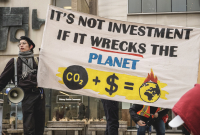Support strong Canadian climate journalism for 2025
As faculty members at the University of Toronto, we were pleased to read Amy Mann’s recent opinion piece in Canada’s National Observer, “Beware all promises to reach net-zero emissions with offsets.”
Organizations are increasingly using obfuscating language and sophisticated brand management strategies to polish their climate bona fides, and Mann, an undergraduate studying atmospheric physics at the U of T, wants her university to substantiate the claims made on behalf of its much-touted Climate Positive initiative.
Quite legitimately, she asks, is: “Climate Positive” a laundered version of the increasingly discredited “net zero”?
We don’t know unless the university administration backs up its claims with data.
“Climate Positive” is the slogan preferred by U of T administration because it suggests the university will not only cut emissions associated with its operations to “net zero” but will go above and beyond (“defying gravity,” to use the administration’s own paradoxical branding slogan).
In U of T’s case, this means promising to reduce 80 per cent of its emissions “through absolute carbon reductions on campus,” while offsetting the remainder (“and beyond”) by “generating renewable energy on university properties off-campus” and by “staying flexible to explore and incorporate emerging technologies and approaches.”
Even if we accept these long-term promises at face value, what are we supposed to make of such nebulous concepts as “staying flexible” in a plan that claims to be addressing what U of T president Meric Gertler has previously referred to as the “global threat” posed by fossil fuel-driven climate warming?
Where are the data supporting the claim that U of T will be able to generate solar energy to account for 20 per cent of its energy needs “and beyond” by 2050? The Climate Positive website says the plan is to achieve a “climate positive campus” by “us[ing] renewables and other strategies” to “offset” the balance of campus carbon emissions and “further reduce other carbon emissions in Ontario.”
But these “other strategies,” which include the wholly unproven solution called “carbon capture,” are left distressingly vague. Moreover, what does it mean U of T plans to be “Climate Positive” while refusing to count emissions associated with the enormous amounts of new construction it is undertaking (the university plans to double its floor space on the downtown campus by 2050)?
What we are seeing at U of T, as elsewhere, is an increasing blurring of the lines between policies meant to address social crises and “branding” strategies designed for success in the highly competitive market for international tuition dollars.
Not surprisingly, glossy Climate Positive brochures fail to mention that UTAM, the organization that manages the university’s multibillion-dollar endowment fund, continues to make indirect investments in fossil fuel companies eight years after Gertler’s own ad hoc committee of experts recommended the university “refrain from making any new investments” in fossil fuel companies.
As we all know by now, local sustainability efforts amount to Band-Aid solutions as long as oil and gas companies and the banks that finance their activities continue to enjoy the social licence that reputable institutions like U of T grant them by investing in their stocks and partnering to fund climate initiatives.
We can and should have debates about and test the veracity of U of T’s greenhouse gas (GHG) emissions mitigation plans, and we can and should disagree at times. Atmospheric warming is already having catastrophic effects, particularly for those least responsible for bringing it about.
Universities should be leading the response to this global threat by offering clear, transparent and detailed proposals backed by genuine accountability rather than obsessing over brand identity, marketing catchphrases and global rankings.
Paul Downes is a professor in the Department of English at the University of Toronto and an elected member of the university’s Academic Board. Paul Hamel is a professor in the Department of Laboratory Medicine & Pathobiology in the Faculty of Medicine at the University of Toronto. Scott Prudham is a professor at the University of Toronto, appointed in the Department of Geography. Gavin Smith is professor emeritus in the Department of Anthropology, University of Toronto.









Comments
I'm not an expert on climate change or global warming or any of that. However, the UofT is located in Ontario, and Ontario has both Hydro-Electric and Nuclear power. Both of these energy sources are environmentally friendly - especially when compared to Solar and Fossil Fuels. The solution seems simple to me. Just change heating and other controls to electric from the Ontario grid and it is done. Don't use natural gas or diesel (with the exception of an emergency generators) and being compliant to energy neutral is done.
BTW - Solar is certainly not the answer since they can not be recycled and only have a lifecycle of twenty years in Canada (less the farther south you get. They are temp sensitive for the lifecycle)
"Recycling 'end-of-life' solar panels, wind turbines, is about to be climate tech's big waste business" (CNBC)
*
Recycling of solar panels is still in its infancy in N America, but underway. 90% of the materials in a solar panel are recyclable.
"Some of the highest value materials are copper, silver, aluminum [frames], glass, and crystalline silicon." Silicon (glass), aluminum (frame) and copper (wiring) are inert. The biggest problem is waste and pollution in the manufacturing process.
"The first generation of solar panels will wear out. A recycling industry is taking shape" (AP, 2023)
*
In a 2016 study by the Int'l Renewable Energy Agency (IRENA), it was estimated that recovered materials from solar panel recycling could be worth $450 million US by 2030 and exceed $15 billion by 2050.
Sunset Renewable Asset Management is a Canadian company focusing entirely on recycling materials from the renewable energy industry. The majority of the recycled material is glass (60 to 75%), plastic (up to 10%), and aluminum (up to 10%), but silicon and metals such as copper and silver are also recovered.
The Alberta Recycling Management Authority (ARMA) is refurbishing solar panels for re-use.
*
Universities can strive for carbon-neutral operations on campus, but they also invest in (and give social license to) fossil-fuel companies and the big banks that back them.
Given the way commodities markets have been going, the solar panels will be worth more by the time they're recycled, than they were to begin with as working solar panels!